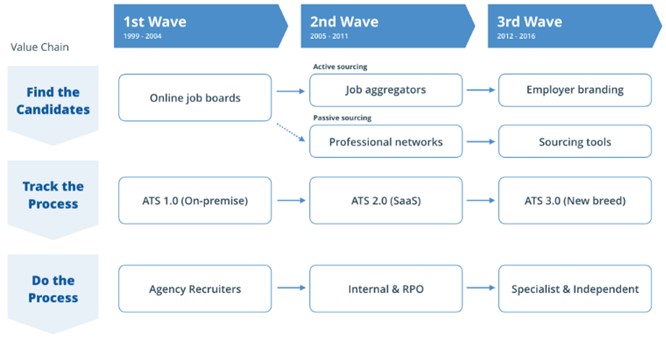Are you wondering if Artificial Intelligence (AI) might take over your role? AI is currently one of the most talked-about subjects. Particularly when it comes to its potential to replace human roles.
Over the centuries, technology has changed the way we work. While some job functions have been replaced, new roles have emerged that demand unique skills and experience.
But how has technology created and replaced roles over the past decades?
Typewriters with Computers
Typewriters were used from the late 1800s until the late 1900s, when computers gained popularity. However, in the last few decades, computers and the internet have created 15.8 million new jobs, replacing certain technologies in the market.
Can you think of an occupation that does not depend on computers? In today’s world, computers play a crucial role in most jobs by enabling people to work and connect with others in order to fulfil their job responsibilities.
Telegraphs/mail to Telephones
In the days before telephones, people were creative in the way they stayed connected. They relied on telegraphs, mail, messengers, pigeons, and Semaphore systems. Then, in 1876, Alexander Graham Bell made the first telephone call, changing the game of communication forever. This invention gave rise to new job roles like telephone operators, salespeople, and designers. Nowadays, there do not seem to be any businesses that do not use phones.
Manual labour to Robotics and Automation
What once was made by the hands of workers has now been replaced by industrial robots and automation. The first industrial robot was brought to life in 1962 which sparked interest from many car manufacturers. This resulted in human workers in many manufacturing and assembly lines being replaced. However, this has opened new roles such as robot design, programming, maintenance, and quality control.
ATMs (Automated Teller Machines) to online banking
Before ATMs were invented in 1969, people were bound by banking hours when they needed to deposit or withdraw cash. ATMs revolutionised the banking industry providing 24/7 access to money without relying on human tellers. The introduction of ATMs led to a decline in traditional bank teller roles, and this trend persisted with the implementation of online banking in Australia in 1995. Both ATMs and online banking have given rise to various job roles, including customer support, technicians, and cybersecurity specialists.
Traditional recruitment to recruitment Software
The workflow of recruitment has been the same for the past 20 years with sourcing candidates, interviewing, and selection. The following framework shows the key changes in the recruitment process.

Source: RecruitLoop
The evolution from traditional recruitment of searching through phone books to recruitment software such as LinkedIn and seek has helped the recruitment industry drastically grow. Currently in Australia, the recruitment industry is valued at $4.9bn in 2022 increasing by 7.3% from the previous year.
Human-assisted customer service to automated customer service
In the world of customer service, chatbots and Interactive Voice Response (IVR) systems are becoming increasingly common, gradually taking over the roles of traditional customer service representatives. While this shift may raise concerns about losing the human touch, it also brings about exciting opportunities. With the rise of these AI-powered systems, there is a growing demand for experts in developing and managing them. These professionals play a crucial role in creating more personalised and intricate customer support experiences.
CHATGPT
ChatGPT launched in November 2022 and has already taken the world by storm. ChatGPT (Chat Generative Pre-Trained Transformer) is a cutting-edge AI chatbot born from the ingenious minds at OpenAI. Yet, it has not replaced any jobs however people’s roles and interactions in various fields are going to see significant transformation.
The impact of technology on the job market is undeniable. While it might replace certain job tasks, it also creates a fertile ground for fresh, exciting opportunities that demand unique skills and knowledge. Embracing technology and continuously upgrading our skills will be key to thriving in this dynamic and evolving landscape.
How do you anticipate technology will influence your role, and do you feel confident in your ability to adapt effectively to these technological changes over time?

